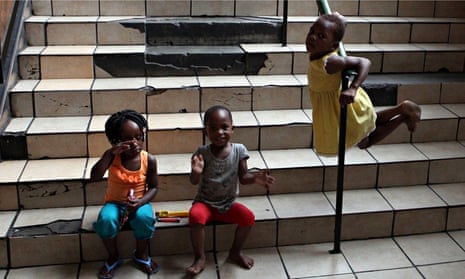A South African church that has given shelter to more than 30,000 refugees closed its doors to them on Thursday, leaving the remaining occupants with an uncertain future.
The Central Methodist Church in central Johannesburg became a haven for people fleeing political violence, especially in neighbouring Zimbabwe, but caused resentment among city authorities who blamed it for encouraging crime.
Bishop Paul Verryn, who turned the church into a sanctuary for the destitute and homeless, denied that he had been ousted after 18 years. “Nothing has been forced upon us,” he said. “This is a decision I made under no external pressure whatsoever but I felt the time is right to move on to something different and new. It’s been a huge part of my life for a long time but I’m not bereft. A season comes and a season goes.”
In 2000 the church began to take in a few dozen people who were too vulnerable to live on the street and soon attracted undocumented migrants from countries including Burundi, Rwanda and Zimbabwe. In 2008 xenophobic attacks against African immigrants and political turmoil in Zimbabwe saw the numbers of refugees in the church swell to more than 3,000 including over 100 unaccompanied children.
“Many of them were quite desperate and despondent,” Verryn recalled. “That is what opened the doors. Many would come to this place having been tortured and seriously violated.”
They slept in slum-like conditions on floors, stairs and pews amid broken windows and the stench of urine. Alcoholism, gang crime and diseases such as cholera were a constant threat and deaths not uncommon. But there were also notable achievements including a clinic, adult training workshops, fitness classes and a school which began in 2008 and last year achieved a 100% pass rate in every subject. The school will continue and is now seeking alternative accommodation.
The number of refugees was around 460 on Christmas Eve, according to Verryn, and since then has dropped substantially, with the remainder being “asked to leave” rather than forcibly evicted. Many have moved to the nearby Soweto township or made other arrangements, he added.
Verryn, 62, will continue to be a church superintendent in Soweto and work as an anti-poverty campaigner, while it is hoped the church he leaves behind, which never ceased running Sunday services, will undergo a renovation likely to cost millions. “It couldn’t just carry on indefinitely, forever. There’s no doubt the building has taken a hammering.”


